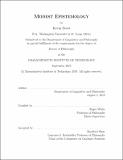Modest epistemology
Author(s)
Dorst, Kevin(Kevin Matthew)
Download1142635407-MIT.pdf (1.139Mb)
Other Contributors
Massachusetts Institute of Technology. Department of Linguistics and Philosophy.
Advisor
Roger White.
Terms of use
Metadata
Show full item recordAbstract
Thinking properly is hard. Sometimes I mess it up. I definitely messed it up yesterday. I'll likely mess it up tomorrow. Maybe I'm messing it up right now. I'm guessing you're like me. If so, then we're both modest: we're unsure whether we're thinking rationally. And, it seems, we should be: given our knowledge of our own limitations, it's rational for us to be unsure whether we're thinking rationally. How, then, should we think? How does uncertainty about what it's rational to think affect what it's rational to think? And how do our judgments of people's (ir)rationality change once we realize that it can be rational to be modest? This dissertation makes a start on answering those questions. Chapter 1 introduces a general framework for modeling situations in which you are rational to be unsure what the rational opinions are. I first show how this framework allows us to precisely formulate the questions from the "higher-order evidence" literature. I then use it to argue that rational modesty is needed to explain the epistemic force of peer disagreement, and therefore that any theory of such disagreement must be based on a general theory of rational modesty. Many have suggested that such a theory can be easily formulated based on the enkratic intuition that your first-order opinions must "line up" with your higher-order ones. But I argue that this is incorrect: whenever modesty is rational, so too is epistemic akrasia. We need to look elsewhere for a general theory of rational modesty. Chapter 2 offers one. I build a theory that -- in a precise sense -- allows as much modesty as possible while still guaranteeing that rationality is a guide. The key principle -- which I call Trust -- formalizes the truism that it's likely that what the evidence supports is true. I show that Trust permits modesty, ensures that rational opinions are correlated with truth, and is necessary and (in a wide class of scenarios) sufficient to vindicate the truism that you should always prefer to respond rationally to your evidence. In sum, Trust establishes that there is a principled way for rational people to be modest. Chapter 3 applies this theory of rational modesty to the psychology of human reasoning. In particular, a wide range of studies suggest that people have a tendency to predictably polarize in the face of conflicting evidence: to gather and interpret evidence in a way that leads them to predictably strengthen their prior beliefs. This "confirmation bias" is standardly taken to be a hallmark of human irrationality. It need not be. I first prove that whenever modesty can be rational, so too can predictable polarization. I then argue, further, that this abstract possibility may play a role in the actual polarization we observe. In particular, given common structures of rational modesty generated by the process of cognitive search, rational agents who care only about the truth should sometimes exhibit confirmation bias. So, I say, epistemology can simultaneously learn from mathematics and inform psychology. That is part of a broader narrative. This dissertation makes the argument that epistemology can be rigorous while also being relevant; that it can be formal while also being applicable; and that it can be abstract and principled, while also teaching us about ourselves. That is the hope, at least. Read it, and perhaps you will agree.
Description
This electronic version was submitted by the student author. The certified thesis is available in the Institute Archives and Special Collections. Thesis: Ph. D. in Linguistics, Massachusetts Institute of Technology, Department of Linguistics and Philosophy, 2019 Cataloged from student-submitted PDF version of thesis. Includes bibliographical references (pages 123-131).
Date issued
2019Department
Massachusetts Institute of Technology. Department of Linguistics and PhilosophyPublisher
Massachusetts Institute of Technology
Keywords
Linguistics and Philosophy.